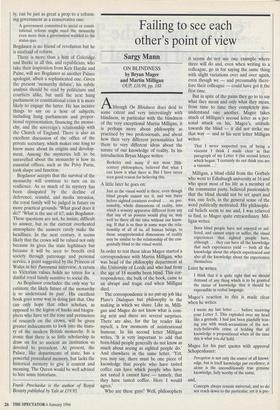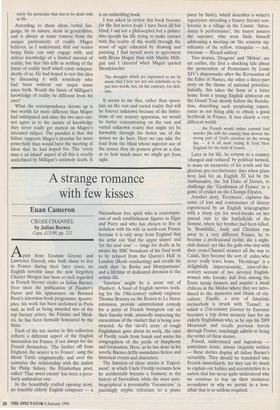Failing to see each other's point of view
Sargy Mann
ON BLINDNESS by Bryan Magee and Martin Milligan OUP, £16.99, pp. 188 Although On Blindness does deal to some extent and very interestingly with blindness, in particular with the blindness of the very exceptional Martin Milligan, it is perhaps more about philosophy as practised by two professionals, and about how their very different personalities led them to very different ideas about the nature of our knowledge of reality. In his introduction Bryan Magee writes:
Berkeley and many if not most 20th- century philosophers, believed that what I can know is what there is. But I have never seen good reason for believing this.
A little later he goes on:
Just as the visual world is there, even though blind people cannot see it, and was there before sighted creatures evolved . . . so, pre- sumably, whole dimensions of reality, into which a sensory apparatus different from any that any of us possess would plug us, may well be there all the time without our know- ing. If that is so then in some ways the rela- tionship of all of us, all human beings, to those unapprehended dimensions of reality may be similar to the relationship of the con- genitally blind to the visual world.
In order to test these ideas Magee started a correspondence with Martin Milligan, who was head of the philosophy department at the University of Leeds and who had from the age of 18 months been blind. This cor- respondence, the bulk of the book, came to an abrupt and tragic end when Milligan died.
The correspondence is no put-up job like Plato's Dialogues but philosophy in the making in which we share. Like us, Milli- gan and Magee do not know what is com- ing next and there are several surprises. There are also, for the lay reader like myself, a few moments of unintentional humour. In his second letter Milligan writes, `It is very important to add that born-blind people generally do not know as much about seeing as sighted people do.' And elsewhere in the same letter, 'Yet, you may say, there must be one piece of knowledge that people who have tasted coffee can have which people who have not tasted it cannot have — namely, that they have tasted coffee. Here I would agree.'
Who are these guys? Well, philosophers it seems do not use one example where three will do and, even when writing to a colleague, go in for saying the same thing with slight variations over and over again, even though we — and presumably there- fore their colleague — could have got it the first time.
But in spite of the pains they go to to say what they mean and only what they mean, from time to time they completely mis- understand one another. Magee takes much of Milligan's second letter as a per- sonal attack on his, Magee's, attitude towards the blind — it did not strike me that way — and in his next letter Milligan writes: That I never suspected you of being a visionist I think I made clear in that paragraph of my Letter 4 (his second letter) which began: 'I certainly do not think you are a visionist.
Milligan, a blind child from the Gorbals who went to Edinburgh university at 16 and who spent most of his life as a member of the communist party, believed passionately that the blind should not be set apart and was, one feels, in the general sense of the word politically motivated. His philosophi- cal beliefs seem to me and, I was relieved to find, to Magee quite extraordinary. Mil- ligan writes:
Born blind people have not enjoyed or suf- fered, and cannot enjoy or suffer, the visual experiences that sighted people have, although . . . they can have all the knowledge that such experiences yield — both all the knowledge about the objects experienced and also all the knowledge about the experiences themselves.
Later he writes:
I think that it is quite right that we should demand of any thing which is to be granted the status of knowledge that it should be expressible in verbal language.
Magee's reaction to this is made clear when he writes: I wrote my last letter . . . before receiving your Letter 5. This exploded over my head like a grenade. I had just been playfully teas- ing you with mock-accusations of the not- truly-believable crime of holding that all knowledge is propositional when all the time this is what you did hold.
Magee for his part quotes with approval Schopenhauer:
Perception is not only the source of all knowl- edge, but is itself knowledge par excellence; it alone is the unconditionally true genuine knowledge, fully worthy of the name,
and,
Concepts always remain universal, and so do not reach down to the particular; yet it is pre- cisely the particular that has to be dealt with in life.
According to these ideas verbal lan- guage, by its nature, deals in generalities, and is always at some remove from the unique particularity of reality. Magee believes, as I understand, that our senses being finite can only engage with, and deliver knowledge of a limited amount of reality, but that this tells us nothing of the limits of reality itself which exists indepen- dently of us. He had hoped to test this idea by discussing it with somebody who had been without our major sense since birth. Would the limits of Milligan's knowledge of reality be different from his own?
What the correspondence throws up is two worlds far more different than Magee had anticipated and since the two men can- not agree as to the nature of knowledge they never really get started on Magee's intended subject. The paradox is that this failure supports Magee's premise far more powerfully than would have the meeting of ideas that he had hoped for. The 'every man is an island' aspect of all this is cruelly underlined by Milligan's untimely death. It is an enthralling book.
I was asked to review this book because for the last seven years I have been all but blind. I am not a philosopher but a painter who spends his life trying to make contact with the reality of the world through the sense of sight educated by drawing and painting. I find myself more in agreement with Bryan Magee than with Martin Milli- gan and I cheered when Magee quoted Mendelssohn:
The thoughts which are expressed to me by music that I love are not too indefinite to be put into words, but, on the contrary, too defi- nite.
It seems to me that, rather than specu- late on the vast and varied reality that will be forever unknown because of the limita- tions of our sensory apparatus, we would be better concentrating on the vast and varied unknown reality that might yet be knowable through the better use of the senses we do have. Here we can take the lead from the blind whose superior use of the senses they do possess gives us a clue as to how much more we might get from sight.



















































 Previous page
Previous page